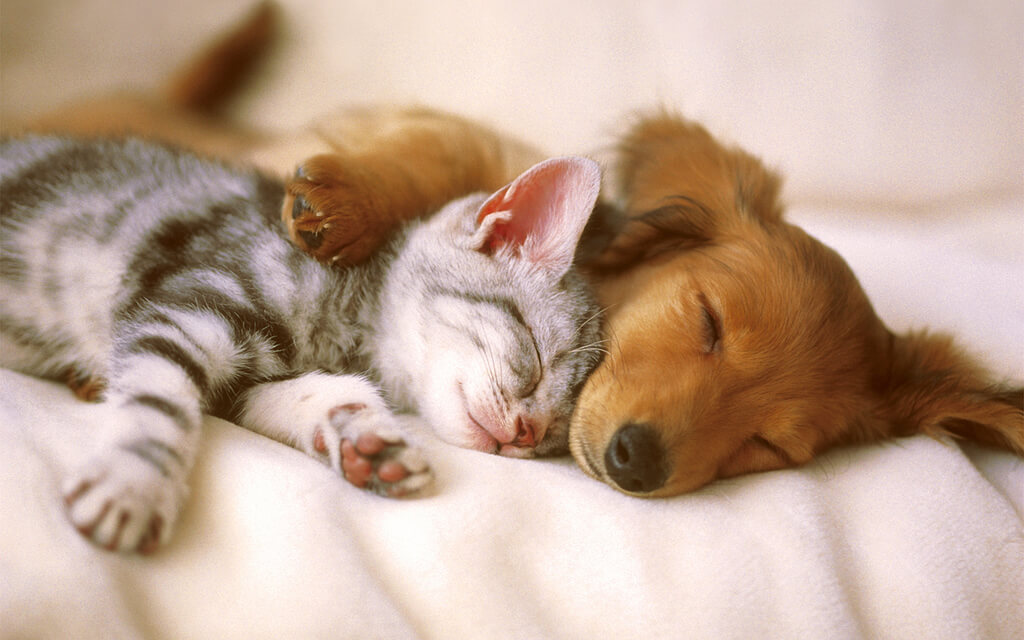Winter can be a wonderful and cosy time with your pet. There’s nothing quite like snuggling up on the couch with a warm animal on your lap and a new season of your favourite show on the television.
But just like us, pets feel the change of season acutely, and their needs will change accordingly. As a pet owner, you’ll need to make a few changes to your usual pet care to ensure they stay healthy and happy.
Here are seven ways to help look after your pet’s health and wellbeing in winter.
Get a fetching winter coat
Who said fashion was only for humans? Clothes can help keep pets warm through the colder months too, especially if they’re short-haired or a little older, and therefore more likely to lose body heat quickly. There are a range of options available, from jumpers to coats. Make sure your purchase fits well and doesn’t restrict movement. Ideally, you want the clothing to cover your pet from their neck to the base of the tail. Keep the clothing clean and dry, as you would your own.
Introduce clothes slowly to get your pet used to the idea, but bear in mind: not all pets will be as excited about their new coats as you might be, and you may find that your pet simply doesn’t tolerate clothing. If that’s the case, don’t force it; there are other ways to keep your furry friend warm.
Keep your pet active
Most pets require exercise year-round, and winter is no different. However, it’s important that you adapt your exercise routine where possible to limit their exposure to cold weather. If you can, walk your dog during sunlit hours to help mitigate the cooler temperatures. You can also take shorter walks or kit your dog out in a warm jacket or coat. If you do opt for animal winter wear, you’ll need to watch your pet for signs of overheating, especially if they’re prone to running and playing.
Keep an eye out for indicators your pet may be too cold, too. For example, if they’re whining, shivering, or showing signs of wanting to discontinue their walk, they should probably be taken inside. In more serious instances, such as if your pet is shivering uncontrollably or is unable to move, you should seek urgent veterinary assistance in case of hypothermia.
As a general rule, keep cats and dogs out of the cold, wind and rain. If it’s uncomfortable for you to be outside then it’s probably uncomfortable for them, too. During bouts of particularly bad weather, you can explore indoor entertainment options instead to keep your pets active and prevent boredom. Play games in sheltered spaces like a garage or a long hallway if it’s safe to do so, or experiment with food puzzles and hide and seek games as alternative forms of enrichment.
Keep the bed warm
If your pet doesn’t already have their own bedding, winter is the perfect time to supply them with it. Your local pet retailer should have options for you to choose from. Place the bedding somewhere warm and dry; rooms like laundries and bathrooms tend to stay cold, so consider using extra blankets and padding if your pet will be spending time there overnight.
Give extra care to senior pets
If your furry friend is a bit older, you’ll want to pay special attention to their wellbeing during winter. Conditions like arthritis can be exaggerated by cold weather, so keep an eye out for signs that your pet might be in any pain. Extra bedding can help with sore joints (as well as keeping the cold away) but you should speak to your veterinarian if you suspect arthritis, as your pet may require medication to help manage their condition.
Groom regularly
Grooming remains important through winter, even though it can be tempting to grow your pet’s hair long for extra warmth. Hair or fur that’s left ungroomed can lead to skin problems in some pets, not to mention matting and knots in the hair itself. To avoid any problems, brush your pet regularly and keep their hair or fur trimmed to a manageable and comfortable length.
Resist the urge to overfeed
Who doesn’t love an extra big serving of dinner in winter? Increases in your pet’s appetite may occur during the colder months simply due to their need for more energy to regulate their core body temperature. However, it’s important that you don’t overfeed your pet, as this can lead to unnecessary weight gain and related health problems. Speak to your veterinarian if you’re unsure about how to manage your pet’s diet through winter.
Take your pet for vet check-ups
There’s more to winter pet care than just rugging up on the couch with your furry friend. Regular check-ups with your local vet can help make sure your pet stays warm, happy and healthy all winter long. The couch will still be there for you both when you get home.

Looking for Pet Insurance?
They bring out your best. Help protect them with Medibank Pet Insurance.
Three updated cover levels now available!ꭥ Plus, health members save 10% on premiums.# T&Cs apply.
-
Important things you should know
Medibank Pet Insurance is issued by The Hollard Insurance Company Pty Ltd ABN 78 090 584 473, AFSL 241436, is arranged and administered by PetSure (Australia) Pty Ltd ABN 95 075 949 923, AFSL 420183 (PetSure) and is promoted and distributed by PetSure’s Authorised Representative (AR) Medibank Private Limited ABN 47 080 890 259, AR 286089. Terms, conditions, waiting periods and exclusions apply. Any advice provided is general only and does not take into account your individual objectives, financial situation or needs. Please consider the Product Disclosure Statement (PDS) to ensure this product meets your needs before purchasing. PDS and Target Market Determination available at medibank.com.au/pet-insurance

